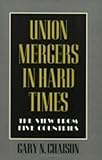Union Mergers in Hard Times : The View from Five Countries / Gary N. Chaison.
Material type: TextSeries: Cornell International Industrial and Labor Relations ReportsPublisher: Ithaca, NY : Cornell University Press, [2018]Copyright date: ©1996Description: 1 online resource (256 p.) : 4 drawings, 15 tablesContent type:
TextSeries: Cornell International Industrial and Labor Relations ReportsPublisher: Ithaca, NY : Cornell University Press, [2018]Copyright date: ©1996Description: 1 online resource (256 p.) : 4 drawings, 15 tablesContent type: - 9781501722516
- 331.87 22
- HD6490.C62 C43 1996eb
- online - DeGruyter
| Item type | Current library | Call number | URL | Status | Notes | Barcode | |
|---|---|---|---|---|---|---|---|
 eBook
eBook
|
Biblioteca "Angelicum" Pont. Univ. S.Tommaso d'Aquino Nuvola online | online - DeGruyter (Browse shelf(Opens below)) | Online access | Not for loan (Accesso limitato) | Accesso per gli utenti autorizzati / Access for authorized users | (dgr)9781501722516 |
Browsing Biblioteca "Angelicum" Pont. Univ. S.Tommaso d'Aquino shelves, Shelving location: Nuvola online Close shelf browser (Hides shelf browser)

|

|

|

|

|

|

|
||
| online - DeGruyter Fat King, Lean Beggar : Representations of Poverty in the Age of Shakespeare / | online - DeGruyter Creating a Chinese Harbin : Nationalism in an International City, 1916-1932 / | online - DeGruyter Dewey on Democracy / | online - DeGruyter Union Mergers in Hard Times : The View from Five Countries / | online - DeGruyter Unions and Legitimacy / | online - DeGruyter What Ought I to Do? : Morality in Kant and Levinas / | online - DeGruyter Reasonable Democracy : Jürgen Habermas and the Politics of Discourse / |
Frontmatter -- Contents -- Tables -- Figures -- Acknowledgments -- Acronyms -- CHAPTER 1. Introduction: The Union Merger Process -- CHAPTER 2. The United States: Merging for Growth and Survival -- CHAPTER 3. Canada: New Pressures and Possibilities -- CHAPTER 4. Great Britain: The Merger Tradition Continues -- CHAPTER 5. Australia: Rationalization through Amalgamation -- CHAPTER 6. New Zealand: In The Aftermath of the 1,000-Member Rule -- CHAPTER 7. Conclusions: The Merger Option in Hard Times -- APPENDIX 1. Union Mergers in the United States, 1980-1994 -- APPENDIX 2. Union Mergers in Canada,1980-1993 -- APPENDIX 3. Union Mergers in Great Britain, 1980-1993 -- APPENDIX 4. Union Mergers in Australia, 1980-1994 -- APPENDIX 5. Union Mergers in New Zealand, 1986-1993a -- Notes -- References -- Index
restricted access online access with authorization star
http://purl.org/coar/access_right/c_16ec
The past fifteen years have been difficult for the labor movements in industrial countries. Gary N. Chaison addresses questions implicit in the decline of unions in the United States, Canada, Great Britain, Australia, and New Zealand: How and why do labor unions merge under pressure? What role do mergers play in the unions' strategies to deal with membership losses, management opposition, and hostile governments? Are there distinctive national profiles of union mergers?Chaison begins by describing the dynamics of the union merger process as large unions combine with each other in amalgamations, as small unions are absorbed into larger ones, and as local unions affiliate into nationals. He discusses the reasons for mergers, the barriers to consolidation, and the problems of integration which may result. The five chapters that follow are arranged in order of increasing intensity in merger activity, ranging from the United States, where interest in mergers is growing, to New Zealand, where changing legislation has catalyzed an enormous wave of mergers. For each of the five countries considered, Chaison characterizes the industrial relations climate and merger record since 1980, explains landmark mergers, identifies the antecedents, and assesses the chances that a sudden flood of mergers will occur. The final chapter compares the national profiles, extrapolating the significant differences and common threads. Chaison concludes that while mergers can play a critical role in revitalizing labor movements and building the dominant unions of the future, they are not necessarily solving the fundamental economic and political problems that plague unions.
Mode of access: Internet via World Wide Web.
In English.
Description based on online resource; title from PDF title page (publisher's Web site, viewed 26. Apr 2024)


